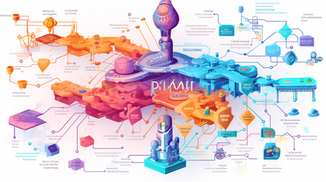Exploring AI Marketing Innovations for Business Growth
- Home
- Exploring AI Marketing Innovations for Business Growth
Marketers must keep up with the quick changes in AI Marketing to remain competitive. This blog post will delve into some groundbreaking developments in artificial intelligence and their implications on marketing strategies.
 From Google's latest innovations at I.O., such as Bard and its unique capabilities, we'll explore how these advancements are transforming content consumption and marketing practices. We'll discuss the importance of adapting marketing language for an AI-driven world while prioritizing website conversion over organic search traffic.
From Google's latest innovations at I.O., such as Bard and its unique capabilities, we'll explore how these advancements are transforming content consumption and marketing practices. We'll discuss the importance of adapting marketing language for an AI-driven world while prioritizing website conversion over organic search traffic.
Furthermore, we'll examine writing tools that enhance the clarity of thought and how to code explanation is shifting towards more human-centric communities. Lastly, we will analyze Google's competitive advantage erosion due to rapid replication among competitors and the significance of differentiation through niche offerings in today's market.
Stay tuned as we navigate this exciting journey into AI Marketing Innovations and equip you with valuable insights to leverage in your business strategy.
Table of Contents:
- AI Marketing Innovations
- Marketing AI Examples
- Chatbot Technology
- Customer Experience
- Bard's Unique Capabilities
- Writing Tools & Clarity of Thought
- Code Explanation & Community Support Shifts
- First Principles & Disrupting Yourself
- Google's Competitive Advantage Erosion
- FAQs in Relation to Ai Marketing Innovations
- Conclusion
AI Marketing Innovations

As the marketing industry continues to evolve, integrating AI has become a game-changer for many businesses. Artificial intelligence and machine learning have made it possible to create more effective marketing campaigns and engage customers in new ways.
Marketing AI Examples
Email marketing is one area where AI has made a significant impact. AI tools can help businesses leverage AI to create more personalized and effective email campaigns. By analyzing customer data, businesses can tailor their email marketing to specific target audiences and predict which customers are most likely to engage with their content.
Another area where AI is making waves is content creation. AI platforms can help businesses create interesting content that engages potential customers throughout their customer journey. By analyzing customer data, businesses can provide insights into what types of content are most effective at each stage of the customer journey.
Chatbot Technology
Chatbot technology is another area where AI is providing significant benefits. Chatbots can be used to provide customer support and answer frequently asked questions. They can also provide dynamic pricing and make decisions based on customer data.
Deep learning and predictive analytics are also being used to provide insights into customer behaviour. By analyzing customer data, businesses can gain a better understanding of their target audiences and make more informed decisions about their marketing strategies.
Customer Experience
One of the most significant benefits of integrating AI into marketing is the ability to improve the customer experience. By providing personalized content and support, businesses can engage customers in new ways and improve their overall satisfaction with the brand.
Overall, AI marketing innovations are changing the way businesses approach marketing. By leveraging AI tools and technology, businesses can create more effective marketing campaigns, engage customers in new ways, and improve the overall customer experience.
Google's Innovations at I.O. have revolutionized the way we interact with technology, providing us with a powerful tool in Bard that surpasses ChatGPT and allows for voice input integration to improve user experience. With its unique capabilities such as internet search functionality within conversations and summarization of web pages for quick information access, Bard is sure to be an invaluable asset when it comes to AI marketing innovations.
Bard's Unique Capabilities

As a powerful AI tool, Bard boasts several unique features that set it apart from competitors like OpenAI and ChatGPT. These capabilities not only enhance user experience but also provide valuable assistance in various aspects of digital marketing.
Internet Search Functionality within Conversations
Rather than requiring users to switch between platforms for information gathering, Bard integrates internet search functionality directly into conversations. This feature allows marketers to access relevant data without leaving the platform, streamlining their research process and increasing efficiency. For example, when discussing keyword strategies with team members or clients on the platform, users can quickly pull up related search volume statistics or competitor analysis right within the conversation.
Summarization of Web Pages for Quick Information Access
In today's fast-paced digital landscape, time is often a scarce resource for busy marketing professionals. To help save time and effort spent on sifting through lengthy web pages for key insights, Bard offers an advanced summarization feature that condenses online content into easily digestible snippets. By leveraging this capability alongside its integrated search function, marketers can swiftly gather pertinent information to inform their campaigns without getting bogged down by extraneous details.
Apart from these standout functionalities mentioned above,
- Bard assists in improving SEO optimization through content creation tools,
- takes voice inputs for seamless user interaction,
and more - all designed to empower businesses as they navigate an increasingly competitive market space driven by AI innovations.
To fully harness the potential of these cutting-edge capabilities offered by Google's new offering, Whitehat Inbound Marketing suggests implementing a comprehensive strategy that leverages Bard's features to optimize content, streamline workflows, and ultimately drive growth for your company. By staying ahead of the curve with AI-driven marketing tools like Bard, businesses can gain a competitive edge in an ever-evolving digital landscape.
Bard's unique capabilities of internet search functionality within conversations and summarization of web pages for quick information access provide a more efficient way to find the right content quickly. This leads us into exploring how AI marketing innovations can impact content consumption and marketing, such as adapting language for an AI-driven world and prioritizing website conversion over organic search traffic.
Impact on Content Consumption & Marketing
As artificial intelligence (AI) continues to evolve rapidly, it will change how we consume content online - moving towards more direct communication with simple language. This shift will force marketers to adapt their strategies accordingly by focusing on storytelling while optimizing their websites for conversions rather than just informational searches. In this section, we'll discuss the implications of these changes and explore ways businesses can prepare for an AI marketing-driven world.
Adapting Marketing Language for an AI-Driven World
The rise of powerful tools like Paul.ai's Bard, which surpasses ChatGPT in capabilities, is transforming the way users interact with search engines and digital platforms. With voice input integration becoming increasingly prevalent, consumers are likely to expect quick answers in a conversational tone. As a result, marketers must adjust their approach by adopting simpler language that resonates with both human readers and AI algorithms alike.
- Create content using clear and concise wording.
- Avoid jargon or overly technical terms when possible.
- Incorporate natural-sounding phrases that align with user queries.
Prioritizing Website Conversion Over Organic Search Traffic
In light of these technological advancements, it's crucial for businesses to prioritize website conversion rates instead of solely relying on organic search traffic as a measure of success. By focusing on creating engaging user experiences that drive action - whether through signing up for newsletters or making purchases - companies can better position themselves within an ever-changing marketing industry:
- Analyze your audience: Understand who your target audiences are and what motivates them to take action. Use tools like Google Analytics or customer surveys to gather insights.
- Optimize your website: Ensure that your site is easy to navigate, loads quickly, and is mobile-friendly. Implement clear calls-to-action (CTAs) throughout the customer journey.
- Tell compelling stories: Develop content that engages and interests potential customers by sharing relatable experiences or showcasing customer success stories. Leverage multimedia formats such as video or interactive elements to enhance engagement.
In an AI marketing-driven world where customers expect quick answers and seamless interactions, marketers must adapt their strategies accordingly. By embracing the simple language and prioritizing website conversion over organic search traffic, businesses can stay ahead of the curve while capitalizing on the opportunities presented by AI innovations like Bard from Paul.ai. Integrating AI tools like predictive analytics, deep learning, and chatbot technology can provide insights into customer data and help make decisions that improve the customer experience and dynamic pricing.
The impact of AI on content consumption and marketing is undeniable, with the potential to revolutionize how we approach digital campaigns. Moving forward, writing tools and clarity of thought will be essential for success in this new landscape.
As AI technology continues to evolve, marketers must adapt their strategies by using simpler language and prioritizing website conversion over organic search traffic. Tools like Paul.ai's Bard are transforming the way users interact with digital platforms, making it crucial for businesses to analyze their audience, optimize their website, and tell compelling stories that engage potential customers. By embracing these changes, companies can stay ahead of the curve in an ever-changing marketing industry.
Writing Tools & Clarity of Thought
As AI-powered writing tools like OpenAI and Google's Bard continue to gain popularity, concerns have been raised about the potential impact on human creativity and critical thinking skills. Some critics, such as entrepreneur Paul Graham, argue that relying too heavily on these technologies may lead people away from developing clarity of thought through writing themselves.
The Role of AI in Writing Processes
In response to these concerns, it is essential to recognize that AI can play a supportive role in the writing process when used responsibly. For instance, using an AI tool for generating first drafts or brainstorming ideas can save time and help overcome writer's block. However, writers should still engage with their work actively - refining content based on their unique perspectives and expertise.
Fostering Creativity alongside AI Assistance
- Maintain authorship: Writers must ensure they retain control over their work by editing any content generated by an AI tool before publishing or sharing it with others.
- Critical evaluation: Evaluate the suggestions provided by your chosen writing assistant critically; do not accept them blindly without considering if they align with your intended message or tone.
- Diversify sources: To avoid becoming overly reliant on one particular technology or platform, consider experimenting with various tools while also seeking inspiration from traditional resources such as books and articles written by experts in your field.
A Balanced Approach for Optimal Results
To make the most out of both human creativity and artificial intelligence, a balanced approach is key. By using AI tools as an extension of your writing process, you can harness their potential to streamline tasks while still retaining the human touch that makes content engaging and authentic.
For example, Grammarly can help identify grammatical errors or suggest improvements in sentence structure without entirely replacing the writer's input. Similarly, platforms like Frase offer valuable insights into SEO optimization for online content creators - providing suggestions based on data-driven analysis but leaving room for writers to make final decisions about how best to implement these recommendations.
In essence, embracing AI-powered writing tools should not come at the expense of developing clarity of thought through personal engagement with one's work. Instead, it offers an opportunity to enhance productivity and creativity by leveraging cutting-edge technology alongside human expertise.
Writing tools and clarity of thought are essential for successful inbound marketing strategies, so understanding the available resources is key. With code explanation and community support shifting to more human-centric models, AI can be used as an accelerant to help marketers better reach their target audiences.
AI-powered writing tools like OpenAI and Google's Bard can play a supportive role in the writing process when used responsibly. Writers should maintain authorship, critically evaluate suggestions provided by AI assistants, diversify sources, and use a balanced approach to harness their potential while still retaining the human touch that makes content engaging and authentic.
Code Explanation & Community Support Shifts

As artificial intelligence (AI) technology continues to advance, it is transforming not only the way we consume content but also how we interact with online communities. One of the most significant changes expected in this domain is the shift from relying on platforms like Stack Overflow for code explanations to seeking more human-centric interactions.
The Decline of Stack Overflow and Rise of Human-Centric Communities
With advanced AI tools like Google's Bard capable of providing effective code explanations within search results or forums, users may find themselves less reliant on traditional resources such as Stack Overflow. User interest in these platforms may diminish as a consequence of the emergence of AI tools. However, this does not mean that people will stop seeking support from their peers altogether. Instead, they might gravitate towards more human-centric communities where they can engage in meaningful conversations and develop deeper connections with fellow professionals.
AI as an Accelerant for Platforms like Reddit
In contrast to the potential decline of some community-driven websites due to AI advancements, other platforms such as Reddit may experience growth by embracing artificial intelligence technologies. By integrating AI-generated answers into its platform while still maintaining a strong focus on fostering genuine human interaction and collaboration among its users, Reddit has an opportunity to become even more valuable within its niche.
- Balancing Act: The key to successful integration lies in striking a balance between leveraging powerful AI capabilities without overshadowing or replacing authentic human connection.
- New Opportunities: With increased reliance on AI-generated answers comes new possibilities for businesses looking to create value-added services around these technologies - think personalized learning experiences or specialized consultation offerings tailored specifically towards individual needs.
- Adapting Strategies: As AI continues to disrupt traditional community dynamics, marketers must adapt their strategies to stay relevant in this ever-changing landscape. This could involve focusing on building relationships and fostering genuine connections with target audiences rather than solely relying on informational content.
In order to stay ahead of the curve, it is essential that businesses and individuals remain flexible and open-minded when adopting new AI technologies. Keeping tabs on the advances of AI and how they can influence digital circles is essential to be ready for a world where AI has an even more noticeable role in our lives.
The emergence of AI-driven marketing innovations has been a major shift in the way code explanation and community support are provided. This trend is set to continue as we explore how first principles can be used to disrupt ourselves further.
As AI technology advances, there will be a shift from relying on platforms like Stack Overflow for code explanations to seeking more human-centric interactions. While some community-driven websites may experience decline due to AI advancements, other platforms such as Reddit have an opportunity to become even more valuable within their niche by integrating AI-generated answers while still maintaining a strong focus on fostering genuine human interaction and collaboration among its users. The key is striking a balance between leveraging powerful AI capabilities without overshadowing or replacing authentic human connection.
First Principles & Disrupting Yourself
In today's rapidly evolving AI landscape, it is crucial for businesses to disrupt themselves before being disrupted. As repetitive and informational tasks are increasingly taken over by AI technologies, companies should focus on identifying areas where they can leverage their unique strengths while embracing the rapid advancements in artificial intelligence. To stay ahead of the competition, companies must embrace AI advancements and strategically leverage their unique strengths.
One key aspect of this self-disruption process involves adopting a first-principles thinking mindset. By breaking down complex problems into fundamental components, businesses can develop innovative solutions that challenge conventional wisdom and drive growth. This methodology allows organizations to create new value propositions instead of merely iterating on existing ideas.
- Identify core competencies: Companies must determine which aspects of their business provide the most significant competitive advantage and focus resources on enhancing these capabilities further.
- Leverage technology strategically: Businesses should explore how advanced AI tools like Google's Bard or OpenAI's GPT-3 can be integrated into their operations to streamline processes, improve decision-making, or enhance customer experiences.
- Create an innovation culture: Encourage employees at all levels within the organization to think creatively about problem-solving and embrace change as an opportunity for growth rather than a threat.
Organizations must not only adjust to the current environment of disruption but also actively strive for innovation in order to guarantee their long-term success. For instance, marketers might consider leveraging cutting-edge AI-driven content creation tools to craft more engaging and personalized messaging that resonates with their target audience. Additionally, businesses could explore new ways of using AI-powered analytics to uncover hidden patterns in customer data, enabling them to make better-informed strategic decisions.
Ultimately, embracing the rapid advancements in artificial intelligence requires a willingness to challenge traditional assumptions and adapt existing business models accordingly. Companies should leverage AI to gain a competitive edge and foster innovation in an increasingly saturated market.
Grasping the basics of marketing and pushing yourself to conceive novel ideas can give your business an edge over its rivals. Now let's explore how Google's competitive edge is being eroded by rapid replication of innovations among competitors.
To stay ahead of the curve in today's AI landscape, businesses must disrupt themselves by adopting a first principles thinking mindset and identifying their core competencies. They should strategically leverage advanced AI tools and create an innovation culture to drive growth and maintain a competitive edge. Ultimately, embracing rapid advancements in artificial intelligence requires challenging traditional assumptions and adapting existing business models accordingly to harness the power of these technologies for lasting competitive advantages.
Google's Competitive Advantage Erosion
While Google showcased impressive performance at I/O, its competitive advantage may be eroding as other major players such as Microsoft, Meta, Amazon, and Apple can quickly replicate new features released by the tech giant. In order to differentiate itself within this space, Google will need to continue innovating with smaller models or niche offerings.
Rapid Replication of Innovations Among Competitors
The technology landscape is evolving rapidly, making it easier for companies like Microsoft, Meta (formerly Facebook), Amazon Web Services (AWS), and Apple to catch up with Google's advancements in AI marketing innovations. As these firms invest in R&D, they can swiftly incorporate comparable characteristics into their offerings shortly after a rival unveils them.
This rapid replication makes it difficult for any single company to maintain a long-term competitive edge based solely on technological innovation. Rather than counting on just initial advantages, firms should concentrate on developing distinct value propositions that make them stand out from the rest.
Importance of Differentiation Through Niche Offerings
To stay ahead in the ever-changing world of AI marketing innovations, Google needs to think beyond simply introducing new technologies. One way for the company to do this is by developing smaller models or niche solutions tailored specifically towards specific industries or use cases. For example:
- Focused industry applications: By offering specialized tools designed explicitly for sectors like healthcare, finance, or retail, Google can create unique value for customers in these industries.
- Localized solutions: By developing AI marketing tools that cater to the specific needs of different regions or languages, Google can differentiate itself from competitors that offer more generic solutions.
- User experience innovations: By continually improving user interfaces and interactions with its products, Google can provide a superior customer experience that keeps users loyal to its brand.
In order to maintain a competitive edge, Google must not only develop specialized products but also cultivate lasting relationships with its customers. This includes providing excellent support services and fostering a sense of trust through transparent communication about product updates and future plans. Ultimately, building strong connections with clients will be just as crucial as technological innovation when it comes to maintaining a competitive advantage in the world of AI marketing innovations.
Google's competitive advantage in AI marketing innovations may be eroding as other major players can quickly replicate new features. To differentiate itself, Google needs to continue innovating with smaller models or niche offerings tailored towards certain industries or use cases and invest in long-term relationships with customers to maintain a competitive edge.
FAQs in Relation to Ai Marketing Innovations
How is AI used in marketing?
AI is used in marketing to generate content, analyze audience behaviour, and optimize engagement. Tools like GPT-3 create high-quality text based on given prompts, while algorithms can identify trending topics and keywords for better targeting. Additionally, AI-driven analytics provide insights into user preferences and predict future trends.
What are 5 innovations in AI?
- AlphaGo: A breakthrough program that defeated human Go champions.
- OpenAI Codex: An advanced language model enabling natural code generation.
- AyMO self-driving cars: Autonomous vehicles revolutionizing transportation.
- BERT: Bidirectional Encoder Representations from Transformers improving search engine understanding of context.
- Chatbot technology: AI-powered chatbots providing customer support and improving customer experience.
How has AI improved marketing?
AI has improved marketing by automating repetitive tasks, personalizing customer experiences, predicting consumer behaviour patterns, and optimizing ad campaigns. With machine learning algorithms analyzing vast amounts of data quickly, marketers can make informed decisions, increase efficiency, and achieve higher ROI.
What are the topics for AI in marketing research?
- Customer-centricity leveraging AI to understand and cater to individual customer needs.
- AI-driven content creation: Generating high-quality, engaging marketing materials using language models.
- Sentiment analysis: Utilizing AI to analyze consumer emotions and opinions for better targeting.
For more information on AI in marketing, check out this research paper.
Conclusion
In conclusion, Google's AI marketing innovations are revolutionizing the way businesses approach their digital marketing strategies. With tools like Bard and voice input integration, companies can improve user experience and adapt to an AI-driven world by prioritizing website conversion over organic search traffic. Additionally, the decline of Stack Overflow and the rise of human-centric communities show how AI is accelerating platforms like Reddit.
However, as competitors rapidly replicate these innovations, it's important for businesses to differentiate themselves through niche offerings and disrupt themselves with first principles thinking. At Whitehat, we specialize in helping small companies achieve their growth targets through innovative digital marketing strategies that incorporate the latest AI technologies.
If you're interested in learning more about how our team at Whitehat can help your business stay ahead of the curve with AI Marketing Innovations, contact us today!


